Keyword clustering is a trending keyword organization method that helps SEOs and content marketers deal with millions of keyword data.
The method allows users to classify and cluster keywords with similar search intent. The process seems simple, but it yields extremely high benefits like you never imagine.
Affiliate Disclosure: This post from Victory Tale contains affiliate links. If you subscribe to the tool, we will receive a small commission from the software provider.
Still, as we always value integrity and prioritize our audience’s interests, you can rest assured that we present every keyword clustering tool truthfully.
Benefits of Keyword Clustering
Keyword clustering offers various benefits for your content creation, as follows:
Apart from these benefits, keyword clustering indirectly assists you in organizing your website. Since you can link one group to many others, you will generate numerous internal link building opportunities, smoothening the process of search engine bots crawling your website.
Consequently, as SEO moves away from keyword targeting in the 2020s, you can always be confident that your content still ranks well.
Many of you may now be interested in starting clustering keywords. In fact, you can do it manually. The process is straightforward.
You just need to export the keyword data from your favorite SEO and keyword research tools such as Ahrefs and SEMRush to Excel, then group those with a seemingly similar search intent together.
However, I don’t recommend doing it manually, as the process can be extremely tedious. Instead, I suggest you use keyword clustering tools that utilize machine learning. These tools can automate the task so that you can spend your valuable time elsewhere.
Within minutes, your keywords will be in groups and ready for use. You don’t need to go through all the data to select the right keyword, as you can target them all. Consequently, these keyword clustering tools will save hours of keyword research time.
As true with any software product, not all of them are worth using. Therefore, I have done the heavy lifting for you by researching and cherrypicking those that work. You can then freely choose the one that matches your needs and budget.
1. SE Ranking’s Keyword Grouper
SE Ranking is an excellent SEO tool that offers keyword clustering among its numerous features. If you are looking for a reliable tool to perform this task for you, SE Ranking is unarguably one of the best.
SE Ranking’s Keyword Grouper is possibly one of the most advanced keyword clustering tools in the market and potentially the most accurate.
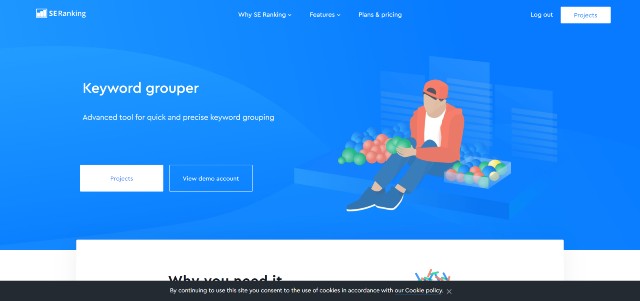
SE Ranking will compare the first ten search results of two keywords during the clustering process. If they have the same search listings, SE Ranking will group them on the same topic, then repeat the same process for the rest of the keywords.
Unlike other keyword clustering tools, you can specify the number of similar search listings to boost clustering accuracy.
For example, you can set the minimum number of matching URLs to 3, so only keywords with more than three similar URLs belong to the same group.
What I find fascinating is that SE Ranking allows you to specify the grouping. Therefore, you can select the search engine you want, country, location, and language for keyword clustering.
Thus, you can use it to create keyword clusters for non-English keywords, which is excellent for multilingual websites.
Finally, SE Ranking has provided an option to add search volume to each keyword in the cluster. Thus, you can view the monthly search volume of keywords in the cluster and the aggregate search volume of the cluster you plan to target.
Regarding the data, you can import it from any source, including Google Search Console, Google Keyword Planner, and other SEO tools such as Ahrefs or SEMRush.
Pricing
You need a paid plan to use SE Ranking’s Keyword Grouper. The lowest-possible pricing starts at $18.60 per month. Additionally, you will also need to pay separately to use for the Keyword Grouper, which costs $0.004 per keyword.
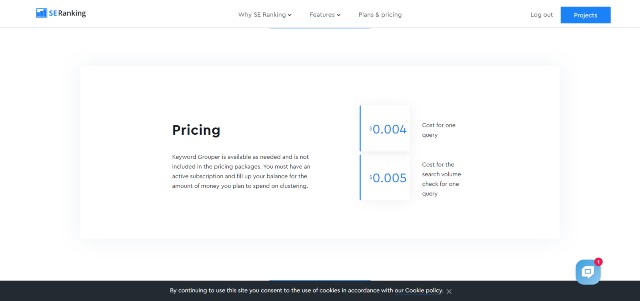
To put it in another perspective, if you have a list of 1,000 keywords, clustering all of them will cost $4, which is not very cheap but not too expensive.
However, if you want the search volume on all individual keywords, you need to pay an extra $0.005, which is costlier than grouping keywords themselves.
I don’t think this add-on is necessary, especially if you upload your own keyword list (i.e., from other SEO tools such as Ahrefs), which may already have search volume data.
Pros and Cons
Pros
- Accurate keyword clustering tool
- Can cluster non-English keywords
- Fully accurate clustering to match the location, language, etc.
- Easy-to-use
Cons
- Users need to pay extra to use the tool as this feature is not included in regular plans.
- Search volume data is costly.
2. Serpstat
Serpstat is another leading SEO tool that offers features that help build keyword groups and clusters to improve your site’s content structure.
Like SE Ranking, Serpstat will create clusters from a list of short-tail and long-tail keywords. The platform will consider semantics and keyword intent and up to 30 top search listings during the creation process to ensure the results will be accurate.
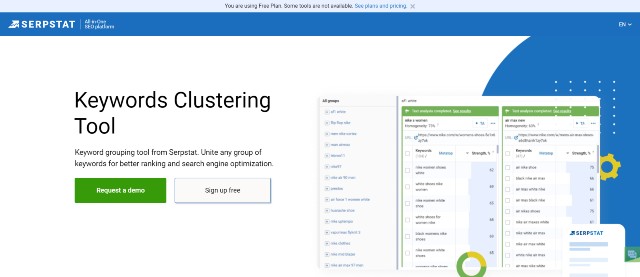
You can also customize the clustering settings. For example, you can choose the clustering level between weak, medium, and hard. Although the degree of customization is not as high as SERanking, you still have the freedom to make changes to view the varied results.
The best thing I have found from this feature is that Serpstat can analyze your published posts and create keyword groups relevant to that page. Hence, you can handily avoid cannibalization issues and build a robust site structure.
Pricing
All Serpstat plans have access to the keyword clustering tool. Currently, Serpstat offers four plans for customers to consider as follows:
- Lite – $69 per month
- Standard – $149 per month
- Advanced – $299 per month
- Enterprise – $499 per month
You can cluster up to 1,500 keywords on the Lite plan. This number will increase accordingly as you upgrade your plan. All plans will also include other SEO features such as keyword research, backlink analysis, site audit, rank tracking, etc.
Based on my experience, 1,500 keywords per month is far too few, especially if you have a long list of keywords (one short-tail, general keyword search such as “bicycle” could generate thousands of keyword variations.)
Therefore, it would be best to select at least the Standard plan (6,000 keywords per month.) Otherwise, you should only use your quota on special keywords that define your niche.
You will need to pay additional fees if you need the search volume data. You will need to contact SerpStat directly to inquire about the pricing information.
Pros and Cons
Pros
- Gather data from up to 30 top search queries
- Analyze any published posts and create topical clusters relevant to that page
- Can customize keyword grouping
- Take both semantics and user intent into account
- Keyword clustering included in regular SEO plans (without the need to pay extra)
Cons
- Need to pay extra for search volume data (not recommended)
- Serpstat’s user interface is not very user-friendly.
3. Surfer SEO’s Content Planner
Surfer SEO is an SEO content optimization tool. However, its developers have recently added new features, allowing users to perform a fully automated process to create topic clusters. As a Surfer SEO customer, I use this keyword clustering tool most in real life.
Let’s see how it works.
First of all, you just need to insert the main keyword. This keyword should be general and broad. In my opinion, it might be a major topic or category that you plan to cover on your website extensively.
In my case, it’s “artificial intelligence.” Within a minute or so, your content planner will be ready.
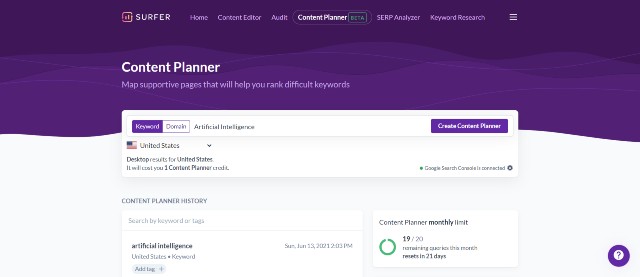
It turns out that Surfer SEO has created 159 clusters surrounding the keyword “artificial intelligence.”
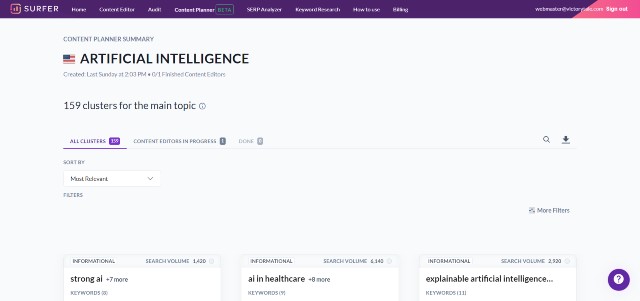
Surfer SEO has sorted these topics with relevancy by default. However, you can also sort them by search volume as well.
You may be overwhelmed by the sheer number of topics. However, this will not cause a problem as you can filter them by search intent (customer investigation, local, shopping, and informational.)
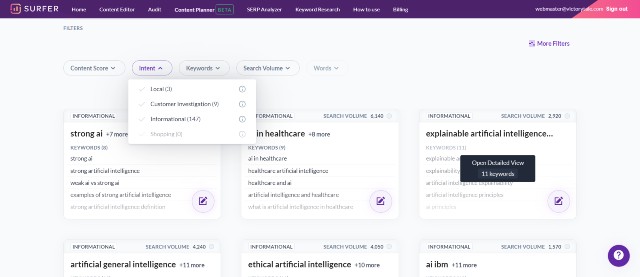
For example, I usually target those with “customer investigation” and “informational,” as the other two do not apply to my niche.
Each keyword will have monthly search volume data attached to it. You don’t have to pay extra like SE Ranking or Serpstat.
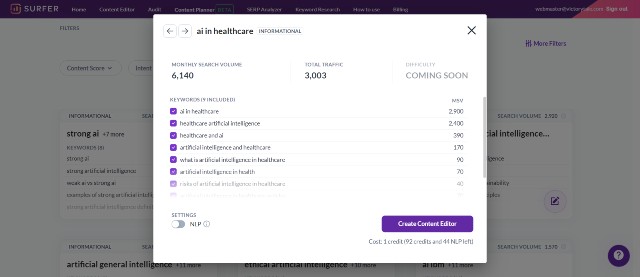
Unfortunately, Surfer SEO does not provide information on how they cluster keywords. However, the results appear to be relevant. The most popular keyword (with the highest search volume) for that topic will serve as the topic name.
You can then create a content editor to optimize it along with other keywords on the topic.
This tool’s only drawback is that you cannot import external data. You need to use data derived from Surfer SEO’s keyword tool, which is decent. Other tools, such as Ahrefs, provide many more keywords. However, I still think the topic clusters Surfer SEO provides are already more than sufficient.
Pricing
Each Surfer SEO plan has access to the content planner. The pricing for these plans starts at $29 per month. You will gain access to other marvelous features of Surfer SEO, including content editor, SERP Analyzer, and many more.
There are no hidden fees. This is all you need to pay.
If you are only interested in keyword clustering, the entry plan, which costs $29 per month, is more than adequate.
Surfer SEO does not offer a free trial. However, 7-day money-back guarantee is available.
Pros and Cons
Pros
- Effortless to use
- Accurate results with correct search intent and search volume
- Cluster multiple keywords much faster than other tools
- No hidden fees. All plans have access to keyword clustering.
- Integrate well with its content optimization tool.
Cons
- Cannot customize keyword clustering process
- Cannot upload your own list of keywords
4. WriterZen’s Keyword Explorer
WriterZen is a newcomer to a highly competitive content optimization industry. Though the tool aims to help writers optimize their content, it also provides an excellent keyword clustering tool with extremely generous resources.
It is straightforward to use this feature. Just use it the same way as traditional keyword tools.
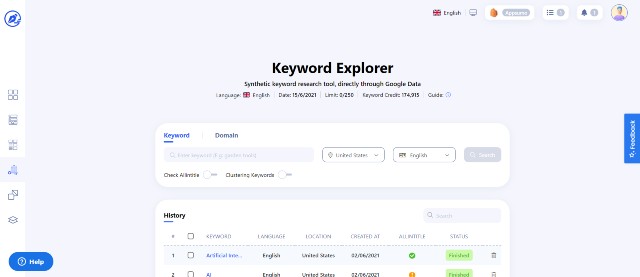
After a while, your topic clusters will be ready.
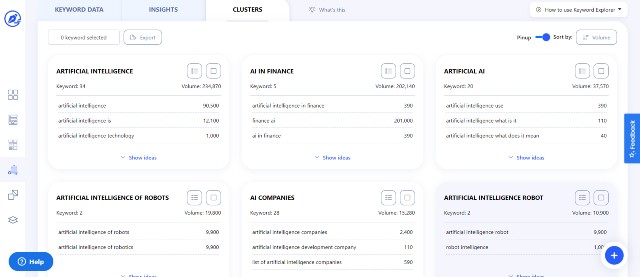
Like other keyword grouping tools, WriterZen compares results on Google SERPs, so I am not surprised that the results are quite accurate.
The great thing is that all individual keywords in each topic come with rich data, including trends, monthly search volume, PPC competition, CPC, and Allintitle ratio.
However, the tool has the same drawback as Surfer SEO: You cannot import your own keywords for WriterZen to cluster them for you. Thus, the number of topics can be limited, as WriterZen’s keyword data might be significantly smaller than other SEO tools.
Pricing
Keyword clustering features are included in every WriterZen plan. As of June 2021, there are two paid plans as follows (all pricing is for annual plans):
- Premium – $49 per month
- Platinum – $70 per month
You can cluster as many as 250,000 keywords per month for the Premium plan and 1,000,000 for the Platinum plan. In my opinion, these numbers are much more than sufficient for content marketers.
All plans also come with content brief creation and topic discovery, which are useful in creating high-ranking content.
Pros and Cons
Pros
- Accurate and fast results
- Clean user interface
- Affordable + Value for Money
- Generous resources for keyword clustering
- Each keyword is equipped with rich data
Cons
- Cannot import your own keyword collection to cluster on site
5. Inkforall
Inkforall, or Ink, has been my favorite content creation tool for many years. In fact, the tool has grown from a basic writing tool to a full-fledged AI-based SEO tool.
Its developers recently introduced a new feature for keyword research and clustering. I did try it and appreciate its simplicity, so I do not hesitate to recommend it to my audience.
First of all, you will need a set of keywords in a .csv file. You can import those from SEMRush or Ahrefs. However, if you do not subscribe to those pricey tools, you can use Ink’s built-in AI keyword research tool.
For example, Ink gives me 276 keywords for the seed keyword “Bangkok” as of below.
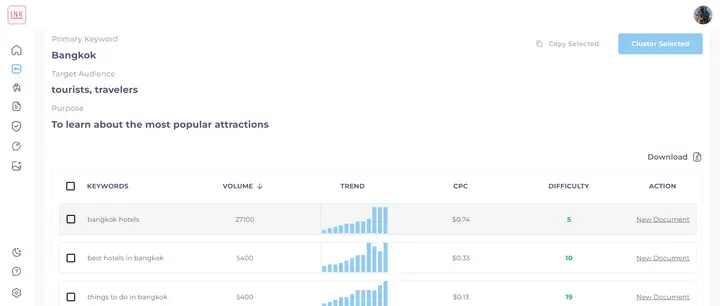
The next step is to select the ones you want Ink to cluster. In my case, I decided to select all that Ink provides me.
Before the process starts, Ink will calculate the number of credits you need. I am not pretty sure of the formula, but clustering 276 keywords needs 980 credits in my case.
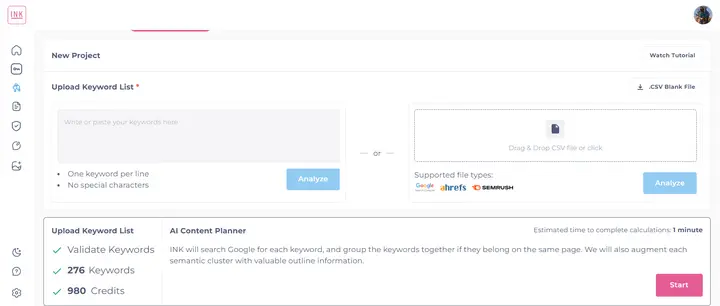
Within less than 20 seconds, the process is completed. I can now download a . CSV file. The data includes keywords I should target, CPC, monthly search volume, and variations.
Generally speaking, this keyword clustering tool is straightforward. I am confident that anyone can use it without any prior SEO knowledge.
Pricing
Unlike most other tools, Ink does not charge additional fees for keyword clustering. Instead, it would use the subscription credits allocated for each month.
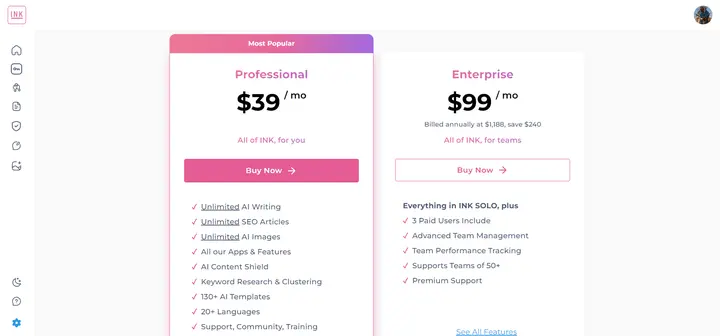
As of February 2023, Ink has the following pricing plan (billed annually).
- Professional – $39 per month
- Enterprise – $99 per month
The professional plan provides 4000 credits, while the Enterprise plan offers 14000. These credits are used only in keyword research and clustering. Hence, the quota is pretty sufficient. I do not think an average content creator would need more than those given in each month.
Furthermore, subscribing to Ink does not give you only keyword clustering. This magnificent tool can perform many other tasks, including AI content generation, optimization, grammar checking, etc.
To conclude, at this price, Ink functions well as an outstanding keyword clustering tool, while other features are a big plus.
Pros & Cons
Pros
- Excellent UI + Effortless to use
- Reasonable pricing
- Rich data results
- Offer various other features to use alongside keyword clustering
- You can upload your data from SEMRush, Ahrefs, and other keyword tools
Cons
- Need to upgrade your plan if you run out of credits
6. Cluster AI
Cluster AI by Content Distribution is a tool that performs only keyword clustering for its users. The company claims that its software can reduce keyword research time by as much as 90% and help its users make smarter keyword decisions.
Let’s see how it works.
Unlike other tools, Cluster AI will not provide keyword data for you. You will need to import the data from third-party tools.
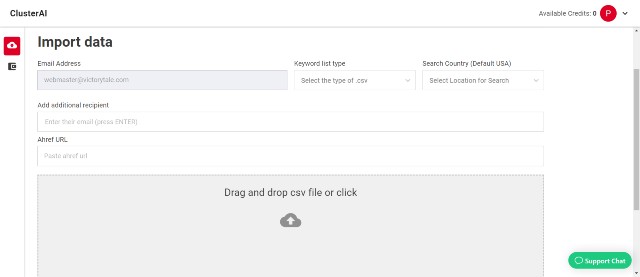
The keyword list type box mainly supports Ahrefs, SEMRush, and Google Search Console. However, I think you can use data from any keyword tool that can export the data in a CSV file.
You will then need to import the CSV file to the Cluster AI platform, specify the search country you want, and add your email address to notify you when the process is ready.
Regarding the process, Cluster AI will crawl search engines and gather keyword data on the first ten search listings. If three or more pages rank for the same set of keywords, Cluster AI will group those keywords. Thus, it is more or less similar to SE Ranking and Serpstat.
I uploaded 700 keywords from Ahrefs, which took Cluster AI almost an hour to complete. The excel file will be available for download.
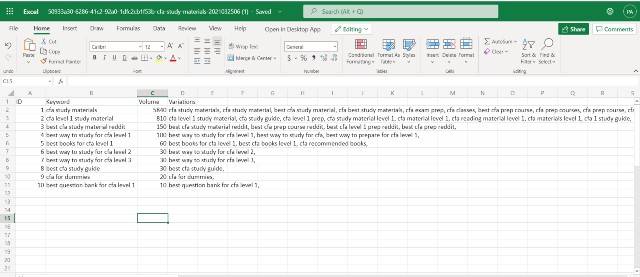
The results will show the main keywords (served as the topic name), monthly search volume for the main keywords, and all variations. This indicates that you can focus on targeting the main keyword, as you can also rank this particular blog post for other variations.
I would say the results are useful but, unfortunately, underwhelming. I expect much more from the tool, as others offer more detailed data and features.
Pricing
Cluster AI has multiple plans for customers, as follows.
- Hobbyist – $39 per month
- Consultant – $89 per month
- Team – $179 per month
- Team+ – $249 per month
- Agency – $389 per month
- Enterprise – $699 per month
All plans have the same features, as the tool has one single feature. Higher plans will provide more resources to perform keyword clustering. Thus the cost per keyword will decrease.
For example, the Agency plan users can cluster as many as 50,000 keywords per month. This is equivalent to $0.008 per keyword.
Regarding pricing, I don’t think Cluster AI provides the best value for money. Their pricing is higher than most competitors, while their available features are meager. Thus, using other tools, such as SE Ranking, is a better alternative.
Pros and Cons
Pros
- Work with any search country
- Straightforward, Easy-to-use
- Useful results
Cons
- Cluster AI does not provide any keyword data. You need to import your own keyword lists generated by other SEO tools.
- Features are meager. The tool can only perform keyword clustering but nothing else.
- Expensive